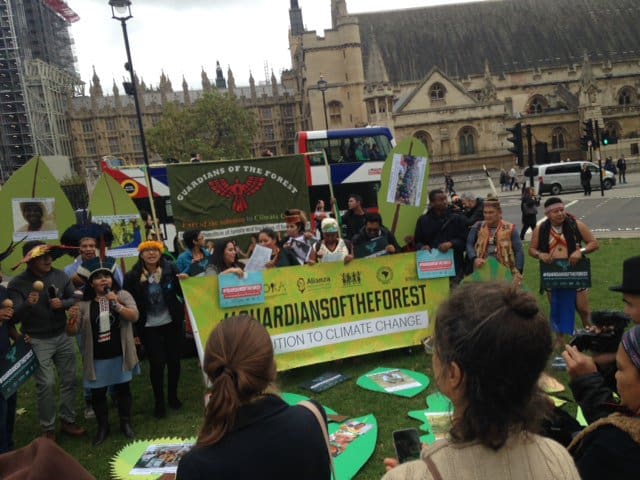The 23rd Conference of the Parties held in Bonn served as a platform to advance two crucial components of the struggle against climate change: securing the community land rights of the world’s Indigenous Peoples and local communities; and recognizing and supporting the role of women in climate change mitigation.
For the first time, the parties agreed to the creation of a platform for local communities and Indigenous Peoples to participate in the climate talks. This marks the first time that governments at the COP have recognized not only the importance of indigenous knowledge but the need to provide a platform for communities at climate talks, given the key role they play in the global struggle to combat climate change. It was also the first time that the conference created a Gender Action Plan (GAP), laying out how governments would build capacity and encourage women’s leadership and gender-sensitive implementation of their work on climate change going forward.
This progress is the result of years of tireless advocacy by indigenous, community, and women’s organizations. In the days leading up to COP 23, indigenous leaders from around the world organized around the banner of the “Guardians of the Forest” and toured several cities in Europe for press events, workshops, meetings with government leaders, and protests before arriving in Bonn. Similarly, the efforts of women’s organizations led to the creation of an Action Day at the COP for creating a plan to further integrate gender into climate policy.


Recognition of Indigenous Peoples and local communities in climate talks is long overdue, given the outsized role these communities play in preserving vital ecosystems and preventing a climate crisis. At least a quarter of the world’s aboveground forest carbon resides in the customary lands of the world’s Indigenous Peoples and local communities—an amount equivalent to 70 percent more than what was emitted globally in 2015. Indigenous and local communities are also the best stewards of these lands: research shows that when communities have secure land rights, deforestation rates are lower and carbon storage higher.
In short, the fight against climate change cannot be won without secure land and resource rights for the world’s Indigenous Peoples and local communities. Indigenous and rural women account for over half of the 2.5 billion people living in these communities, and play a vital role in managing community resources. They contribute to subsistence cultivation and local livelihoods, are often responsible for the food security of their families and communities, and possess unique knowledge regarding forest resources.
The creation of platforms to acknowledge and address the role of Indigenous Peoples, local communities, and rural women may represent a crucial step toward addressing the disparity between the lands Indigenous Peoples and communities protect and depend on and the legal recognition of their rights.
Yet for years, Indigenous Peoples, local communities, and rural women have struggled for recognition in global climate negotiations that pushed them to the margins. Previous COPs have seen governments acknowledge these communities’ traditional knowledge as an important tool for mitigating climate change, while stopping short of calling for recognition of their ability to lead the fight against climate change or to govern their customary lands. Research from RRI found that the vast majority of governments’ plans to fulfill their obligations under the Paris Agreement—known as Nationally Determined Contributions, or NDCs—failed to include recognition of the land and resource rights of Indigenous Peoples and local communities. This failure is emblematic of a broader challenge to ensure recognition of these rights: while at least half of the world’s land is customarily owned by indigenous and local communities, they have legal ownership over just 10 percent.
This situation is particularly acute for indigenous and community women: RRI examined 30 countries and found that not one met its minimum obligations on women’s rights to land under the UN Convention on the Elimination of all Forms of Discrimination Against Women. Indigenous and rural women have made major gains in asserting their rights and strengthening their communities despite the absence of legal protections, yet this progress and the forests they protect are vulnerable.
“We do not want to be just participants here. We want to be heard and we need a decision on the IP knowledge platform coming out of this COP that fulfills our expectations.” – Hindou Oumarou Ibrahim, co-chair of the Indigenous Peoples’ Caucus, speaking in Fiji.
The creation of platforms to acknowledge and address the role of Indigenous Peoples, local communities, and rural women may represent a crucial step toward addressing the disparity between the lands Indigenous Peoples and communities protect and depend on and the legal recognition of their rights. These communities will have a formal platform at future climate talks to exchange knowledge, influence policy, and press for recognition of their rights before world leaders.
The GAP approved at the COP is also an important step toward implementing gender justice in the broader struggle against climate change. It recognizes the vital role that women play in managing resources, and lays out a number of steps that can be taken to better integrate women into climate policy. These include funding workshops on and travel to climate conferences, and capacity-building for women’s groups doing work on climate policy.
Ultimately, however, neither the platform nor the GAP commits states to recognize the land rights of Indigenous Peoples, local communities, and women. Decisions from this year’s COP still put the onus on women and communities themselves to protect their rights to vital lands and forests—rather than on governments. While the platform laid the groundwork for progress in defending the rights of the guardians of the forest, governments will have to make respecting community and women’s land rights a lynchpin of their climate action plans if we are to successfully combat the climate crisis.

About the author: Luke Allen is a Communications Associate at the Rights and Resources Initiative.
Interested in receiving notifications about new blog posts? Subscribe to the RRI blog now to get new posts delivered right to your inbox.
